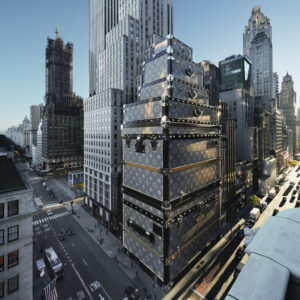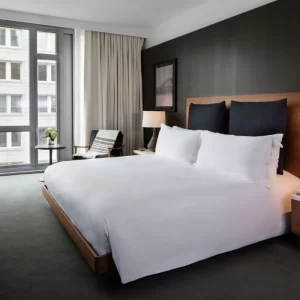About Time You Met: Alexandre Santamaria, Founder of Aware HospitalityBy Alicia Grimshaw
Alexandre Santamaria has many strings to his bow. Founder of food and beverage development company, Aware Hospitality, he started his career in London as a Private Butler for the French Ambassador before working on projects across a number of restaurants in the capital.
Most recently, he’s behind Cha Cha x Sister Jane, a new restaurant in Notting Hill where eclectic cuisine with a Latin twist meets fashion. We chatted to Alexandre about business during the pandemic, his advice for any budding restauranteur, and his favourite dining spots in London:
You have worked for the liked of the Hoxton Hotel, Coya Restaurants and Hakkasan Group – can you tell us a little about your latest projects?
We just launched Cha Cha Sister Jane in Notting Hill which is going extremely well considering the current climate. The particularity of this project is the integration of a restaurant brand and a fashion brand. On top of great food, drinks and design we have staff uniforms and art changing every 6 weeks in line with new collections…Watch this space.
We have also developed a brand-new concept in Riyadh called Bazaru which is opening this November. The challenge there was to avoid doing what everyone else does which is to import an already established European brand under a franchise agreement. We are doing it the other way around, and we are creating a brand in Saudi Arabia that we will export to Europe.
Still in Saudi, we are creating a South Mediterranean concept (Egypt to Algeria) around Arabic food, of course, called Samar. Our aim to revisit Arabic food and elevate it still keeping its traditional flavours.Finally, working on a contemporary Tea room with Foam and Bubble Teas at its heart (name is still confidential) launching Q2 2021…
What can diners expect from the menu at Cha Cha Sister Jane?
Fun high-quality brunch food during the day. By fun, I mean visually pleasing, generous, with an innovative sweet and savoury combination but that still makes you feel comfortable.
In the evening the experience is slightly elevated but not pompous. Great cocktails and talented DJs are expected. We want to create a new hot spot for the Notting Hill community; a sort of a members’ club without a fee.
How do you think restaurants can survive during the pandemic?
Rethinking your business is key. In such an extraordinary time, tweaking your business won’t suffice, a deep remodelling is often necessary. This is time for survival and not just brand protection. Unfortunately, in most cases, if you cannot reduce your fix costs (rent), you will only survive via creating debt. Tough times.
As a consultant, do you think it’s wise for restaurants to continue the Eat out to Help out scheme?
Absolutely yes!
First of all, it can partly solve your cash flow issues. In these difficult times, the key is to drive cash flow and not necessarily the profitability. Cash is oxygen, profit is food. No oxygen and you die in minutes, without food you can survive a month (sorry about the dark analogy).
Secondly, as the scheme ended and you can create your own promotion, you have the option to only discount Food and Beverage items and not the service charge which is again positive for your staff. They still make 100% of their tips. Finally, every person coming through the door is a potential ambassador. Driving bums on seats is also a marketing exercise.
What’s the biggest advice and learnings you could give someone who is looking to open a restaurant in London?
Before you start this adventure, try to feel comfortable with all topics involved. Product (food/mixology/wines/service) is the obvious one but you also need to understand marketing, finance, real estate, and employment law. Thinking you can blindly trust the experts on all those topics to look after your business with the same passion and love you would, is very naive.
You can’t master all topics but equally, do not turn a blind eye on any of them.
What do you think of the capital’s food scene? Where do you like to eat out?
I am obviously emotionally attached to London having spent over 20 years here, but I honestly think the London food scene is ahead of the rest of the world. I would say 3 years ahead of the average.
When I create a concept anywhere in the world, I start by “setting the clock” to be sure I am in line with the local market and that I meet the local customer’s expectations. For example, I believe Paris to be at time zero, London at +3 years, Dubai at -5 years, Oslo at -10, Stockholm at +1 and so on…
As for main market, in a nutshell; New York is very strong on service, the Maitre D’ shares the front stage with the head chef. Paris is rarely quality plus fun – often one or the other. The concepts in Paris are not as multi-dimensional as there are in London, by that I refer to lighting, music and overall vibe.
As for my favourite restaurant, I love Meraki because not only the food is great, but it is the home to my close network, they understand how to create a community.
You developed Japanese pop -up ORO in lockdown – how did the idea come about?
The business model was to rent a part of an existing restaurant’s kitchen to operate it as a dark kitchen and share their Deliveroo page. We kind of created the concept of “Dark Pop-up”.
I approached a good friend of mine, Graziano Arricale Chairman of Chucs restaurant and asked him if he had such space available in his existing restaurants. He did and offered us to rent part of his Belgravia’s restaurant. I was so touched by his trust and impressed by his entrepreneurial spirit. Established brand such as Chucs are rarely so open-minded.
Chef Anthony Garlando (my partner of that project) came up with the name ORO, he loved the way it sounds. We then found out it meant “confusion” in Japanese which worked perfectly as the idea was to serve Japanese food from an Italian restaurant cooked by an Australian chef!
We built the brand in 48 hours and launched the business in 4 days. When there is will, there is a way.
How has lockdown changed the way people eat out?
Not much to be honest, of course people watch the pennies more, but the idea of sharing dishes for instance was not affected as much as I thought it would. The main issue is that the lunch trade in Central London has gone. We need people to return to their office.
What current trends are you seeing in the restaurant industry? Do you think it’s tougher for budding restaurateurs to open places during this current climate?
Usually, there is a lot of “love money” in new restaurants. I mean money invested by family or by other investors who are more looking for a fun investment on the side of their already profitable business. As you can imagine, this type of investors have disappeared, now is not the time to take risks.
As for business planning, new businesses are built with low staff cost, resilience and delivery business in mind right from the beginning. As far as I am concerned, I will only invest in delivery and party dining when it comes to the London market. The idea is that is you are not going to eat at home some delivery food, you are going to want an experience with a special atmosphere.
If you could part with a pearl of wisdom which would help drive bums on seats, what would it be?
A restaurant is like a child, you give them structure, rules, ambition and give them the tools they will need to succeed but at the end of the day, they have their own will.
A restaurant is the same, it is alive; plan, organise, direct but equally, be ready to adapt and let it find its own path once opened. No matter how thorough your business plan and strategy are, your customers will fashion your restaurant and you will have to tweak it according to their feedback. You will have to consider opportunities you did not anticipate and compromise on aspects you thought were bulletproof.








